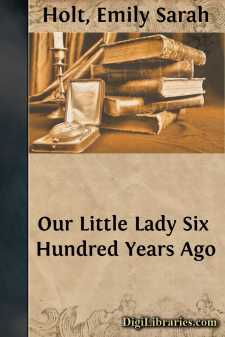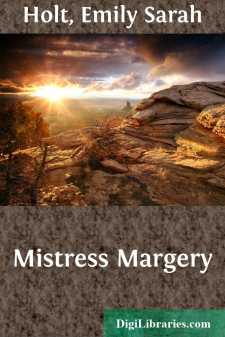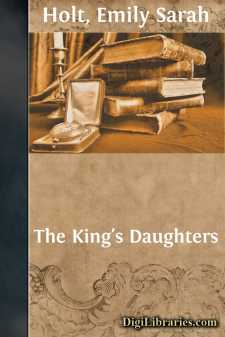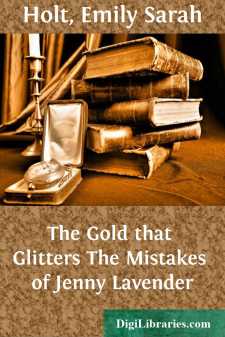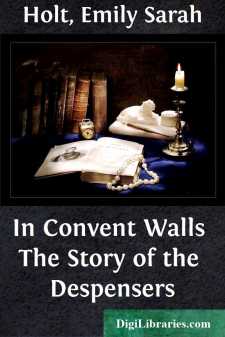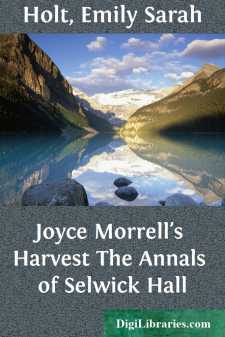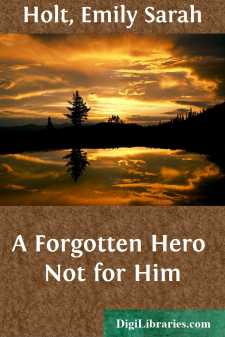Categories
- Antiques & Collectibles 13
- Architecture 36
- Art 48
- Bibles 22
- Biography & Autobiography 815
- Body, Mind & Spirit 144
- Business & Economics 28
- Children's Books 18
- Children's Fiction 14
- Computers 4
- Cooking 94
- Crafts & Hobbies 4
- Drama 346
- Education 58
- Family & Relationships 59
- Fiction 11835
- Games 19
- Gardening 17
- Health & Fitness 34
- History 1378
- House & Home 1
- Humor 147
- Juvenile Fiction 1873
- Juvenile Nonfiction 202
- Language Arts & Disciplines 89
- Law 16
- Literary Collections 686
- Literary Criticism 179
- Mathematics 13
- Medical 41
- Music 40
- Nature 180
- Non-Classifiable 1768
- Performing Arts 7
- Periodicals 1453
- Philosophy 65
- Photography 2
- Poetry 896
- Political Science 203
- Psychology 44
- Reference 154
- Religion 515
- Science 126
- Self-Help 85
- Social Science 83
- Sports & Recreation 34
- Study Aids 3
- Technology & Engineering 60
- Transportation 23
- Travel 463
- True Crime 29
Emily Sarah Holt
Emily Sarah Holt (1836-1893) was a prolific English novelist known for her historical fiction, particularly focusing on the Tudor period. Her works often blended romance with detailed historical accuracy, appealing to a wide audience fascinated by the Renaissance era. Holt's novels were noted for their strong female protagonists and vivid portrayal of English society during pivotal historical moments.
Author's Books:
Sort by:
by:
Emily Sarah Holt
Six Hundred Years ago—What things were like. The afternoon service was over in Lincoln Cathedral, and the congregation were slowly filing out of the great west door. But that afternoon service was six hundred years ago, and both the Cathedral and the congregation would look very strange to us if we saw them now. Those days were well called the Dark Ages, and how dark they were we can scarcely realise...
more...
by:
Emily Sarah Holt
A Regular of Oxenforde. “Give me the book, and let me read; My soul is strangely stirred—They are such words of love and truth As ne’er before I heard!” Mary Howitt. The sun was shining brightly on the battlements and casements of Lovell Tower. The season was spring, and the year 1395. Within the house, though it was barely seven o’clock in the...
more...
by:
Emily Sarah Holt
Choosing a new gown. “Give you good den, Master Clere!” said a rosy-faced countrywoman with a basket on her arm, as she came into one of the largest clothier’s shops in Colchester. It was an odd way of saying “Good Evening,” but this was the way in which they said it in 1556. The rosy-faced woman set down her basket on the counter, and looked round the shop in the leisurely way of somebody...
more...
by:
Emily Sarah Holt
Jenny prepares to go a-journeying. “Jenny, my dear maid, thou wilt never fetch white meal out of a sack of sea-coal.” Jenny tossed her head. It would have been a nice little brown head, if it had not been quite so fond of tossing itself. But Jenny was just sixteen, and laboured under a delusion which besets young folks of that age—namely, that half the brains in the world had got into her head,...
more...
by:
Emily Sarah Holt
Preface. The historical portion of this tale has been partially narrated in one of my previous volumes, “In All Time of our Tribulation,” in which the Despenser story is begun, and its end told from another point of view. That volume left Isabelle of France at the height of her ambition, in the place to reach which she had been plotting so long and so unscrupulously. Here we see the Nemesis come...
more...
by:
Emily Sarah Holt
Friends and neighbours. “Give you good-morrow, neighbour! Whither away with that great fardel (Bundle), prithee?” “Truly, Mistress, home to Staplehurst, and the fardel holdeth broadcloth for my lads’ new jerkins.” The speakers were two women, both on the younger side of middle age, who met on the road between Staplehurst and Cranbrook, the former coming towards Cranbrook and the latter from...
more...
by:
Emily Sarah Holt
Chapter One. The Dwellers at Selwick Hall. “He would be on the mountain’s top, without the toil and travail of the climbing.”—Tupper. Selwick Hall, Lake Derwentwater, October ye first, Mdlxxix. It came about, as I have oft noted things to do, after a metely deal of talk, yet right suddenly in the end. Aunt Joyce, Milly, Edith, and I, were in the long gallery. We had been talking a while...
more...
by:
Emily Sarah Holt
Preface. It is said that only travellers in the arid lands of the East really know the value of water. To them the Well in the Desert is a treasure and a blessing: unspeakably so, when the water is pure and sweet; yet even though it be salt and brackish, it may still save life. Was it less so, in a figurative sense, to the travellers through that great desert of the Middle Ages, wherein the wells were...
more...
by:
Emily Sarah Holt
Castles in the Air. “O pale, pale face, so sweet and meek, Oriana!” Tennyson. “Is the linen all put away, Clarice?” “Ay, Dame.” “And the rosemary not forgotten?” “I have laid it in the linen, Dame.” “And thy day’s task of spinning is done?” “All done, Dame.” “Good. Then fetch thy sewing and come hither, and I will tell thee somewhat touching the lady whom thou art to...
more...
by:
Emily Sarah Holt
We alight at Brocklebank Fells. “Sure, there is room within our hearts good store;For we can lodge transgressions by the score:Thousands of toys dwell there, yet out of door We leave Thee.” George Herbert. “Girls!” said my Aunt Kezia, looking round at us, “I should just like to know what is to come of the whole four of you!” My Aunt...
more...


